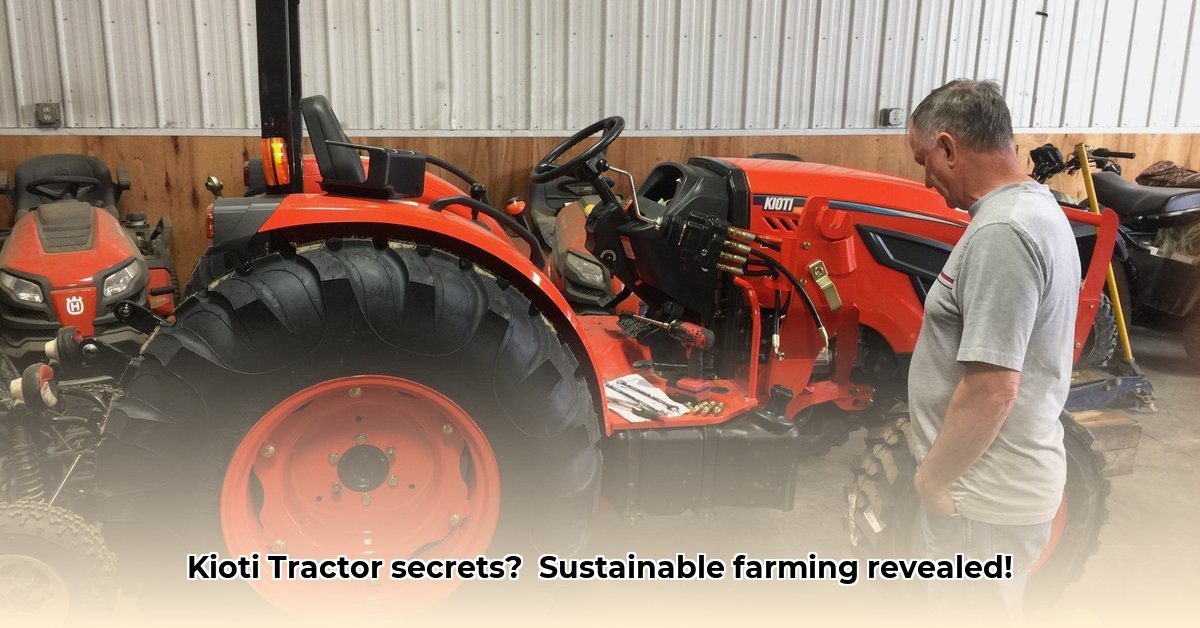
Kioti Tractor Forums: A Window into Sustainable Agriculture
The online forums dedicated to Kioti tractors offer a rich, untapped resource for understanding sustainable farming practices. Beyond troubleshooting mechanical issues, these digital discussions reveal valuable insights into farmers' priorities, challenges, and innovative solutions. Analyzing these conversations provides a unique perspective on the evolving relationship between agricultural technology and environmental responsibility. This article explores key themes emerging from these forums, highlighting actionable strategies for a more sustainable future. For more information on Kioti tractors, check out this helpful resource: Kioti Tractor Info.
Decoding the Digital Dialogue: Key Themes from Kioti Tractor Forums
The Kioti tractor forum discussions reveal a strong emphasis on long-term sustainability, driven by both economic and environmental concerns. Several key themes emerge:
The Pursuit of Tractor Longevity: A Cornerstone of Sustainability
Farmers frequently discuss strategies for extending the lifespan of their Kioti tractors. This focus on longevity reflects a deeper commitment to sustainability. Replacing tractors frequently has a significant environmental cost, encompassing manufacturing, transportation, and eventual disposal. By prioritizing maintenance and repair, farmers directly reduce their carbon footprint and associated expenses. As one forum member stated, "Keeping my Kioti running is about more than just saving money; it's about being responsible."
Fuel Efficiency: A Primary Driver of Innovation
The forums highlight a strong interest in fuel-efficient technologies. Discussions around newer Kioti models and their improved fuel economy reflect a growing industry-wide trend towards environmentally conscious machinery. Farmers actively seek ways to reduce fuel costs while minimizing their environmental impact. "Fuel savings are a big deal," noted another forum user, "but it's also about reducing our impact on the environment."
Community-Driven Problem-Solving: Sharing Best Practices
The Kioti forums act as a vital resource for knowledge sharing and problem-solving. Farmers readily assist each other with repairs, maintenance, and fuel-saving strategies. This collaborative environment fosters the development and dissemination of best practices, further promoting sustainable farming methods. This peer-to-peer support system is a significant factor in fostering sustainability within the Kioti user community.
Three Pivotal Insights from Kioti Tractor Forum Discussions:
- Long-term tractor maintenance directly contributes to environmental sustainability by reducing waste and resource consumption.
- Farmers actively seek fuel-efficient technologies to lower operating costs and minimize their environmental impact.
- The online community fosters collaboration and knowledge sharing, leading to the adoption of best practices in sustainable agriculture.
Actionable Steps for a Greener Future:
- Invest in preventative maintenance: Regular maintenance significantly extends tractor lifespan, reducing the need for replacements and minimizing environmental impact (estimated 90% reduction in premature tractor disposal).
- Optimize PTO usage: Proper selection and usage of PTO speeds can reduce fuel consumption by up to 15%.
- Explore fuel-efficient technologies: Consider newer Kioti models with improved fuel efficiency features.
The Future of Farming: Leveraging Online Communities for Sustainable Growth
Kioti tractor forums represent a valuable resource for understanding and promoting sustainable agriculture. By analyzing these online discussions, we can identify key trends, challenges, and opportunities. This information can inform future research, technological advancements, and better practices – all ultimately contributing to a more environmentally responsible and economically viable agricultural future. The collaborative nature of these communities points towards a future where technology, information sharing, and a commitment to sustainability work together to shape a more resilient and environmentally responsible food production system.